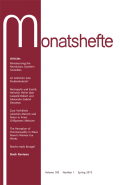
Monatshefte
Scope & Guideline
Connecting Scholars through Rigorous Research
Introduction
Aims and Scopes
- Interdisciplinary Approaches to Literature:
The journal emphasizes the intersection of literature with various fields including history, sociology, and cultural studies, fostering a comprehensive understanding of texts within their socio-political contexts. - Focus on German and German-speaking Cultures:
Monatshefte prioritizes works that delve into German literature and cultural phenomena, addressing both historical and contemporary issues relevant to German-speaking societies. - Exploration of Identity and Memory:
A consistent theme includes the examination of identity, memory, and trauma, particularly in relation to the Holocaust, migration, and postcolonial narratives. - Critical Engagement with Aesthetics and Theory:
The journal encourages discussions around aesthetics, literary theory, and the role of art in society, reflecting on how these elements shape cultural and historical narratives. - Global and Transnational Perspectives:
Recent issues highlight transnational flows within literature, emphasizing the global contexts of German studies and the influence of intercultural exchanges.
Trending and Emerging
- Migration and Transnationalism:
There is a notable increase in scholarship addressing migration narratives and transnational identities, reflecting global movements and their implications on literature and culture. - Queer Studies and Gender Identity:
Emerging studies on queer theory and gender identity are gaining traction, showcasing a growing interest in how these constructs influence literary production and cultural representation. - Environmental and Ecocritical Perspectives:
An uptick in ecocritical analyses indicates a burgeoning interest in how literature engages with environmental issues, reflecting broader cultural conversations about climate change and sustainability. - Postcolonial and Decolonial Critiques:
The journal is increasingly featuring works that interrogate colonial legacies and their impact on contemporary German literature, marking a shift towards postcolonial frameworks. - Intermediality and Digital Literature:
Research exploring the intersections of literature with digital media and other art forms is on the rise, highlighting the evolving nature of literary studies in the digital age.
Declining or Waning
- Traditional Historical Narratives:
There appears to be a decreasing emphasis on conventional historical narratives that focus solely on the chronological recounting of events without critical analysis of their implications in contemporary society. - Regional Literary Studies:
Research centered on specific regional literatures within the German-speaking world seems to be less prominent, possibly overshadowed by more global and transnational approaches. - Purely Aesthetic Critique:
Critical examinations that focus solely on aesthetic appreciation without engaging with socio-political contexts or contemporary relevance are becoming less common. - Classic Literary Canon Studies:
The focus on canonical texts in isolation is declining as scholars increasingly prioritize diverse voices and perspectives, particularly from marginalized communities.
Similar Journals

ZEITSCHRIFT FUR DEUTSCHE PHILOLOGIE
Advancing Scholarship in German Philology and LiteratureZEITSCHRIFT FUR DEUTSCHE PHILOLOGIE is a prestigious academic journal dedicated to the exploration of German philology, literature, and linguistic theory, published by Erich Schmidt Verlag. With a commitment to advancing scholarship in the field, it showcases a diverse range of research articles, critical essays, and theoretical explorations that contribute to the understanding of German language and its literary heritage. While the journal has experienced fluctuating coverage in indexing databases such as Scopus, it remains a valuable resource for researchers and students alike, offering insights into relevant academic discourse. Despite not being openly accessible, the journal continues to serve as an important platform for academic exchange and innovation, allowing scholars to engage with the complexities of language and literature. Its rigorous peer-review process ensures that only high-quality research is published, making it essential reading for anyone invested in the humanities.

MESTER
Fostering Critical Thought in Literature and LanguageMESTER is a distinguished academic journal published by the UCLA College of Humanities, known for its commitment to advancing research in the fields of Cultural Studies, Linguistics and Language, and Literature and Literary Theory. With an ISSN of 0160-2764, this journal serves as a vital platform for scholars and professionals to disseminate innovative research and critical perspectives from diverse theoretical frameworks and cultural contexts. Although currently operating without an Open Access model, MESTER continues to uphold a rigorous peer-review process, ensuring that published articles maintain high academic standards. Recognized for its selective focus, MESTER holds a Q4 categorization in Cultural Studies and Linguistics, and Q3 in Literature and Literary Theory, situating it as a relevant, if emerging, voice within these disciplines. Housed within the significant repository of knowledge at UCLA, the journal beckons researchers, students, and practitioners to engage with its contributions to the humanities and build upon its foundations in cultural discourse.
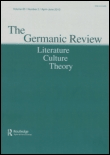
GERMANIC REVIEW
Fostering Dialogue in Germanic Literary and Cultural DiscoursesGERMANIC REVIEW, published by Routledge Journals, Taylor & Francis Ltd, stands as a prominent academic journal dedicated to the study of Germanic languages, literature, and cultural studies. With an ISSN of 0016-8890 and an E-ISSN of 1930-6962, this journal has been a valuable resource for researchers and scholars since its inception, encompassing a wide range of topics within its field. Despite its Q4 ranking in Cultural Studies and Q3 ranking in Literature and Literary Theory, the journal has grown steadily in reputation, with Scopus ranks placing it within the competitive landscape of Arts and Humanities. The journal publishes contributions that delve into historical and contemporary issues, fostering a deeper understanding of Germanic cultures. By bridging literary analysis with cultural discourse, GERMANIC REVIEW invites academics, professionals, and students alike to engage with critical themes and methodologies that redefine the boundaries of Germanic studies. As a subscription-based journal, it remains dedicated to promoting scholarly communication and advancing knowledge in the humanities.
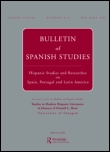
Bulletin of Spanish Studies
Connecting Scholars through Spanish Literary ExplorationBulletin of Spanish Studies is a prominent academic journal dedicated to the exploration and discourse of Spanish studies within the diverse realms of Cultural Studies and Literature and Literary Theory. Published by Routledge Journals, Taylor & Francis Ltd, this journal serves as a crucial platform for scholars, researchers, and students to disseminate their findings and engage in scholarly debates related to Spanish literature, culture, and linguistics. With an emphasis on high-quality, peer-reviewed research, the journal holds a reputable Q3 ranking in Cultural Studies and a commendable Q2 ranking in Literature and Literary Theory, reflecting its significant impact within the academic community. The Bulletin is indexed in notable databases, achieving a rank of #314 out of 1106 in Literature and Literary Theory and #738 out of 1304 in Cultural Studies, signaling its vital role in advancing knowledge in these fields. Although it does not currently offer open access options, the journal remains an essential resource for those passionate about the study of Spanish culture and literature from 2010 to 2024 and beyond.
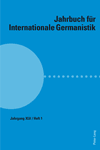
JAHRBUCH FUR INTERNATIONALE GERMANISTIK
Advancing the Frontiers of German StudiesJAHRBUCH FUR INTERNATIONALE GERMANISTIK is a prominent academic journal published by VERLAG PETER LANG AG, dedicated to advancing research in the fields of German studies, literature, and linguistics. With its ISSN 0449-5233 and E-ISSN 2235-1280, this journal provides a platform for scholarly discourse, critical analysis, and innovative studies related to German language and literary theory. Although its coverage in Scopus was discontinued in 2014, the journal continues to be influential within the academic community, evidenced by its rankings in the Arts and Humanities and Social Sciences categories. Specifically, it holds a rank of #397 in Literature and Literary Theory and #477 in Language and Linguistics, reflecting a solid presence among peers. Researchers and students alike can benefit from its insightful articles that delve into various dimensions of Germanistik, thereby fostering a greater understanding of language and cultural contexts. For those interested in contributing to this field of study, JAHRBUCH FUR INTERNATIONALE GERMANISTIK serves as an essential resource for high-quality scholarly content.

Revista de Filologia Alemana
Fostering Critical Insights in German StudiesRevista de Filologia Alemana, published by Universidad Complutense de Madrid, serves as a vital platform for scholarly dialogue in the fields of Linguistics and Literature. With its origins dating back to 1996, this peer-reviewed journal provides insights and critical analyses that foster a deeper understanding of German philology and its broader implications. Although categorized in Q4 across both Linguistics and Literary Theory as of 2023, the journal represents a growing contribution to academic discourse, aiming to enhance knowledge and promote research within these domains. Although it does not currently offer open access, the journal continues to attract submissions from both established scholars and emerging researchers, thereby ensuring a diverse range of perspectives. With Scopus rankings highlighting its position within the academic landscape, Revista de Filologia Alemana is essential for anyone looking to delve into the intricate relationships between language and literature.
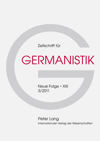
ZEITSCHRIFT FUR GERMANISTIK
Navigating the Evolving Landscapes of German LiteratureZEITSCHRIFT FUR GERMANISTIK, published by PETER LANG GMBH, is a distinguished academic journal that serves as a vital resource in the fields of German studies, literature, linguistics, and cultural analysis. With an ISSN of 0323-7982, this journal provides critical insights and promotes scholarly discourse surrounding the evolving landscapes of German language and literature. Although it operates under a traditional access model, readers and researchers benefit from its rigorous peer-reviewed articles that span decades of intellectual inquiry. Historically featured in Scopus, the journal is noted for its impactful contributions, ranking 244th in Literature and Literary Theory and 406th in Linguistics and Language, highlighting its importance in the academic community. Situated in Bern, Switzerland, ZEITSCHRIFT FUR GERMANISTIK not only caters to scholars seeking to enrich their understanding of Germanic studies but also aims to bridge gaps across interdisciplinary borders, fostering a deeper appreciation of the cultural narratives that shape our world.
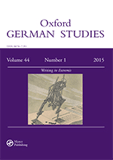
OXFORD GERMAN STUDIES
Fostering Critical Discourse in German LiteratureOXFORD GERMAN STUDIES, published by Routledge Journals, Taylor & Francis Ltd, is an esteemed academic journal dedicated to the exploration and scholarly examination of German literature and linguistics. With an ISSN of 0078-7191 and E-ISSN of 1745-9214, this journal has been in circulation since 1966, offering researchers a unique platform for critical discourse, innovative research, and interdisciplinary dialogue. It holds a significant position in the academic landscape, being categorized in the Q4 quartile for Linguistics and Language and Q3 for Literature and Literary Theory as of 2023. Despite lacking open-access options, the journal thrives in providing invaluable insights, aiming to bridge historical contexts with contemporary perspectives on German studies. It serves as an essential resource for scholars, professionals, and students eager to deepen their understanding of Germanic languages and literature. Located in Abingdon, United Kingdom, the journal continues to uphold its mission of advancing knowledge and fostering scholarly discussions in the rich field of German studies.
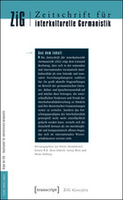
Zeitschrift fur Interkulturelle Germanistik
Advancing Interdisciplinary Perspectives on Language and IdentityZeitschrift für Interkulturelle Germanistik is a leading academic journal specializing in the field of intercultural studies and German linguistics. Published by TRANSCRIPT VERLAG, this journal serves as a platform for innovative research, critical essays, and interdisciplinary discussions that explore the complexities of cultural interactions within the German-speaking world and beyond. With a commitment to fostering scholarly exchange, the journal invites contributions that delve into themes such as language, identity, migration, and cultural dialogue. Although the journal does not currently offer open access, its robust editorial standards are aimed at providing readers with high-quality, peer-reviewed content. Researchers, professionals, and students engaged in German studies will find this journal an invaluable resource for the latest findings and theoretical advancements in intercultural communication and Germanistik. For more information, visit TRANSCRIPT VERLAG's official page.

NEW GERMAN CRITIQUE
Navigating the Complexities of Identity and MemoryNEW GERMAN CRITIQUE is a prominent academic journal published by Duke University Press, focusing on the dynamic intersections of German studies, cultural theory, and social thought. With its ISSN 0094-033X and E-ISSN 1558-1462, this journal facilitates a critical dialogue within the Arts and Humanities and Cultural Studies fields. As a Q3-ranked journal in both categories as of 2023, it represents a significant platform for scholars exploring contemporary issues through a German lens, addressing themes of identity, memory, and cultural politics. Although NEW GERMAN CRITIQUE is not an open-access journal, it remains a crucial resource for researchers, professionals, and students interested in the evolving landscape of cultural studies, inviting contributions that foster innovative perspectives and facilitate intellectual exchange. Founded in 1988 and continuing its vital discourse into 2024, the journal is headquartered in Durham, North Carolina, and serves as a touchstone for those engaged in the complexities of modern German culture and its global implications.